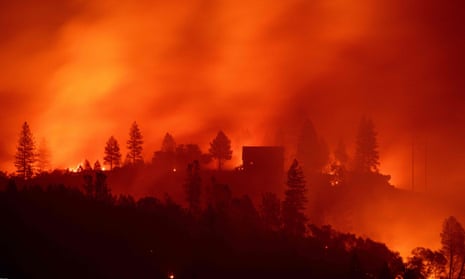In his shoddy manifesto, the accused shooter in Christchurch identified as an “eco-fascist”.
Over the weekend Kellyanne Conway seized on the term – which is unfamiliar to many – to lump him in with so-called “eco-terrorists”, saying “He’s not a conservative. He’s not a Nazi.” No doubt she was banking on common understandings of contemporary environmentalism to draw a link to the political left.
Unfortunately for Conway, Nazism and a twisted version of ecological thinking are joined in the minds of a share of rightwing extremists.
In social media and the more secretive spaces of the online far right, eco-fascists are proselytising for genocidal solutions to environmental problems.
On Twitter, the “pine tree gang”, which journalist Jake Hanrahan describes as “less a cohesive movement than a loosely connected online subculture”, have been promoting ideas that blend a sense of impending environmental catastrophe with themes taken from white nationalism.
This subculture – which so far appears to be small in number – is frequently drawn to a so-called “terror wave” aesthetic, which elevates images of terrorist insurgency; promotes a specific, martial fashion imagery; and fantasies about armed conflict in the wake of environmental and social collapse.
Terror wave forums and threads are full of men in balaclavas, brandishing high-powered weaponry, wearing various combinations of tactical gear, combat uniforms and cheap athleisure wear. Images from the 1990s-era conflicts in the Balkans seem to have a particular appeal.
You can browse terror wave images anywhere from Reddit to Imgur to YouTube or Twitter.
Eco-fascist groups have also been associated with terrorism-promoting neo-Nazi umbrella groups such as The Base, whose alarming online rhetoric was reported on by Vice in 2018.
Of course, the vast majority of contemporary environmentalists – those engaged in the noble, desperate struggle to save the planet from the consequences of human recklessness – are political progressives, and even radical leftists. They are not responsible for the co-optation of environmental thought by the far right, and nor should we conflate their position with that of white nationalists.
But eco-fascism is a longstanding political ideology that is currently undergoing a revival in the fetid culture of the contemporary extremist right. In general, unlike many on the political right, eco-fascists concede the reality of looming ecological catastrophe. But the “solutions” they propose are frankly genocidal.
Eco-fascists have lamented the despoliation of nature, which they associate with modernity and an industrial society which they feel has diminished the connections between race and territory. One of their principal concerns tends to be what they see as human overpopulation, and the tendency of migration and multiculturalism to move races out of their homelands.
This line of thought can ultimately be traced back to figures such as Thomas Malthus, who at the end of the 18th century claimed that population growth was outstripping the capacity for food production, and advocated population control as a solution.
Nothwithstanding the bad-faith “Hitler was a vegetarian” smears of conservatives, a strain of ecological thought was present in Nazism. In one of the most important modern accounts of eco-fascism, Janet Biehl and Peter Staudenmaier say that Nazi ecology was “linked with traditional agrarian romanticism and hostility to urban civilization”, and that ecological ideas were an “essential element of racial rejuvenation”.
The Nazi slogan “blood and soil” was coined by their foremost ecological thinker, Richard Walter Darré, who meant it to capture a mystical link between race and a particular territory.
In the decades since the rise of the modern environmental movement, the far right has continued its efforts to co-opt ecological thoughts and corrupt environmental movements. Some of the most important research on eco-fascism has come from people seeking to resist their entry into the environmental movement.
At the same time, a small number of ecological thinkers have allowed themselves to canvass openly anti-human, eliminationist viewpoints that offer a ready basis for authoritarian, genocidal responses to ecological disaster. This is especially true in segments of the so-called “deep ecology” movement.
Contemporary eco-fascists are inspired by a number of key figures. One is “Unabomber” Ted Kaczynski, whose terrorist campaign against what he called “industrial society” combined violence, misanthropy and a self-dramatising manifesto. Kaczynski’s apocalyptic account of a doomed, destructive civilisation – further expounded in his voluminous prison writings – and his willingness to act as a self-appointed executioner of his adversaries is a central inspiration for the would-be terrorists in the eco-fascist movement.
Some, including Hanrahan, claim that the Netflix drama, “Manhunt: Unabomber”, aided the growth spurt of contemporary eco-fascism.
Another figure who gets a lot of play in contemporary eco-fascist circles is Finnish deep ecologist writer Pentti Linkola, who openly calls for an end to immigration, the reversion to pre-industrial life ways, and authoritarian measures to keep human life within strict limits.
Linkola is responsible for one of the starkest presentations of so-called “lifeboat ethics”, the idea that in the context of ongoing environmental collapse, some people should simply be allowed to die.
“What to do,” Linkola writes in Can Life Prevail, “when a ship carrying a hundred passengers suddenly capsizes and there is only one lifeboat? When the lifeboat is full, those who hate life will try to load it with more people and sink the lot. Those who love and respect life will take the ship’s axe and sever the extra hands that cling to the sides.”
Inspirations such as these have fuelled an online subculture that looks forward to, and even talks about accelerating the end of industrial civilisation. It dreams of a return to a blood and soil relationship between peoples and territories, and of a post-collapse society which will restore the authority of white men.
Some of the people involved in this subculture also venerate dramatic images of insurgency and terror.
It’s still hard to know how much of the alleged shooter’s manifesto to take seriously, but an eco-fascist inspiration is plausible enough to consider as we wait for more information to emerge from his trial and surrounding investigations.
It’s hard to know exactly how many people are immersed in this milieu, but we have seen the damage just one man can do. What else might this ideology inspire?
More broadly, while conservatives (like Trump) are fixated on denialism, parts of the radical right not only acknowledge environmental collapse, but welcome it as an opportunity to re-order society along their preferred lines, and to cleanse the Earth of those they despise.
This makes a democratic, just, and global response to climate change all the more urgent. We must save our planet, and we must not create even the smallest opportunities for fascists.

